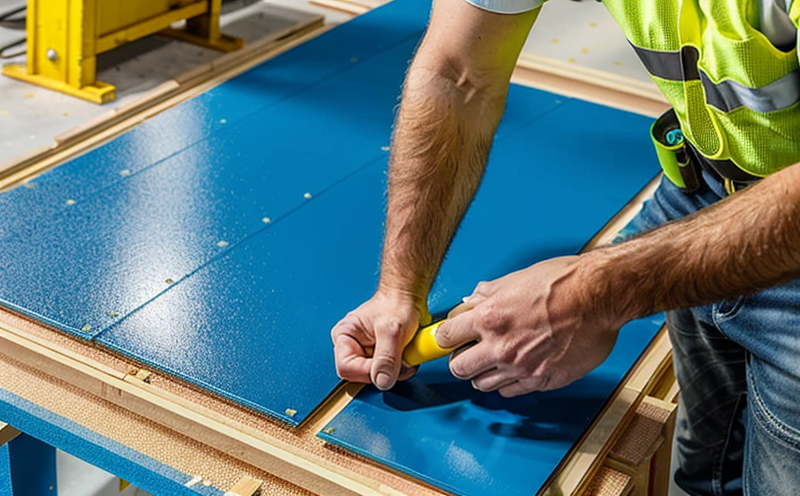Testing the adhesion of materials in construction panels to ensure stability over time
The Crucial Role of Testing Adhesion in Construction Panels Ensuring Stability Over Time with Eurolab
In the construction industry, the stability and longevity of building materials are paramount to ensuring the safety and durability of structures. One critical aspect of material selection is testing adhesion, which refers to the bonding strength between different materials used in construction panels. This process is essential for businesses seeking to guarantee the integrity and reliability of their products over time. At Eurolab, our laboratory service specializes in testing the adhesion of materials in construction panels, providing unparalleled support to manufacturers, architects, engineers, and contractors.
Why Testing Adhesion Matters
Testing adhesion is crucial for several reasons
Prevents Structural Failures Weak adhesion between materials can lead to premature degradation, compromising the structural integrity of buildings. Regular testing ensures that materials adhere to established standards, minimizing the risk of catastrophic failures.
Ensures Durability and Longevity Adhesion testing helps determine a materials ability to withstand environmental factors like temperature fluctuations, moisture, and exposure to chemicals. This information enables manufacturers to select suitable materials for specific applications, ensuring long-term durability and reduced maintenance costs.
Meets Regulatory Requirements Construction projects are subject to various regulations and codes of practice. Testing adhesion ensures compliance with these standards, reducing the likelihood of costly rework or even project abandonment due to non-compliance.
Optimizes Material Selection By understanding the adhesive properties of materials, manufacturers can make informed decisions about material combinations, enabling them to create more efficient, cost-effective, and sustainable products.
Benefits of Working with Eurolab
Partnering with Eurolab for adhesion testing offers numerous benefits
Expertise and Experience Our team of skilled technicians and scientists has extensive experience in conducting adhesion tests using state-of-the-art equipment.
Comprehensive Testing Capabilities We offer a range of testing methods, including shear, lap-shear, and T-peel, ensuring that your materials are evaluated according to industry-specific standards.
Accurate Results and Timely Reporting Our laboratory is equipped with advanced software for precise data analysis, providing you with detailed reports and actionable insights in a timely manner.
Cost-Effective Solutions By outsourcing adhesion testing to Eurolab, you can save time and resources, focus on core business activities, and make informed decisions about material selection.
Frequently Asked Questions
What is the purpose of testing adhesion?
Adhesion testing determines the bonding strength between materials used in construction panels, ensuring that they meet established standards for durability and structural integrity.
How do I prepare my samples for testing?
Our team will guide you through the sampling process to ensure that your materials are properly prepared for testing.
What types of materials can be tested?
We conduct adhesion tests on a wide range of materials, including metals, composites, plastics, and ceramics.
How long does the testing process take?
The duration of our testing services varies depending on the specific test method and material type; however, we strive to deliver results within a few days or weeks, as required by your project schedule.
Are the results confidential?
Yes, all data and findings are kept confidential and solely for the clients use.
Why Choose Eurolab for Adhesion Testing
Eurolab is committed to providing exceptional laboratory services that meet the unique needs of each client. Our
State-of-the-art equipment Ensures accurate and reliable results.
Expert staff Provides comprehensive guidance throughout the testing process.
Rigorous quality control Guarantees that all data and findings are trustworthy.
In conclusion, testing adhesion is a critical step in ensuring the stability of construction materials over time. By partnering with Eurolab, you can trust that your products meet the highest standards for durability and structural integrity, safeguarding the safety and longevity of buildings. Our laboratory service is dedicated to providing top-notch support to businesses seeking to optimize material selection and reduce risks associated with premature failures. Contact us today to learn more about how we can help you achieve peace of mind in the construction industry.
-
Testing the ability of materials to adhere to surfaces without detaching or peeling
-
Evaluating the bond strength of adhesives used in construction materials and coatings
-
Testing whether adhesives maintain their integrity under stress, temperature changes, or environmental conditions
-
Simulating real-world conditions to test the durability of adhesive bonds over time
-
Ensuring that bonding agents used in construction materials such as tiles, paint, or flooring are durable
-
Testing for resistance to forces like shear, tension, and compression that could break the adhesive bond
-
Verifying that adhesive materials can withstand moisture, heat, and other environmental conditions
-
Testing the adhesion of coatings to substrates such as concrete, wood, or metal to ensure durability
-
Simulating heavy load conditions to test how adhesives perform under pressure or weight
-
Ensuring that adhesives used in outdoor and exposed construction applications remain stable
-
Verifying the adhesion of materials used for insulation, membranes, and coatings to various surfaces
-
Testing the peel strength of adhesives used in construction to ensure that bonds do not fail prematurely
-
Simulating the impact of thermal cycling on the adhesion of building materials over time
-
Testing for resistance to chemical exposure that could weaken or break adhesive bonds
-
Ensuring that adhesives maintain their performance under harsh conditions, such as high humidity or freezing temperatures
-
Verifying that adhesives used in joints and seams do not weaken or detach during building settlement or movement
-
Ensuring that adhesives provide a consistent and strong bond without creating voids or bubbles
-
Simulating mechanical stress and vibration to evaluate how adhesives perform in dynamic environments
-
Verifying that adhesives do not cause material degradation or compromise structural integrity over time
-
Ensuring that adhesives used for floor and wall coverings provide secure bonding without excessive wear
-
Testing for any potential failure points in adhesive joints that could cause materials to separate over time
-
Ensuring that adhesives maintain their performance even after long exposure to weather or UV rays




